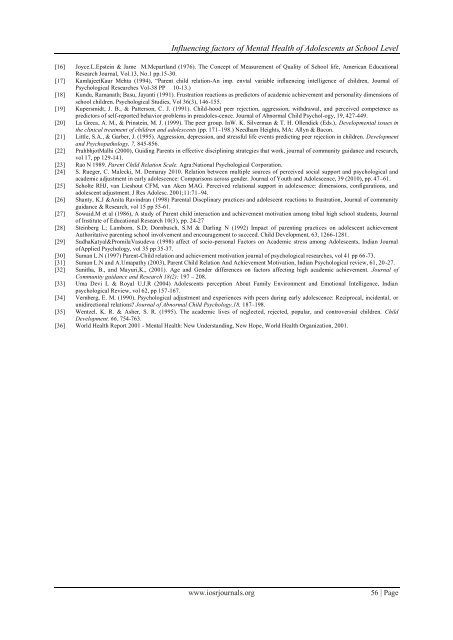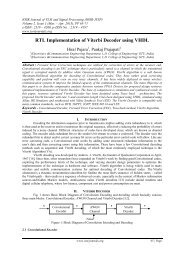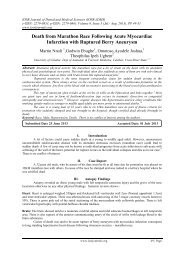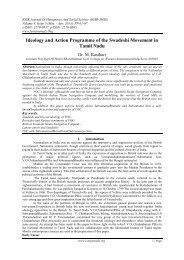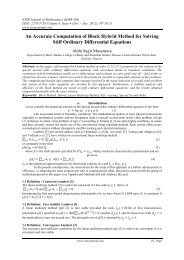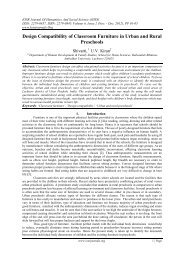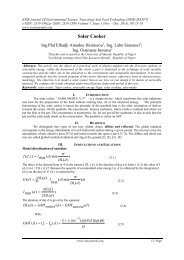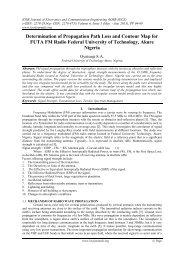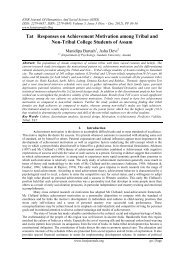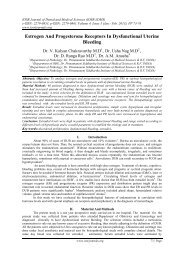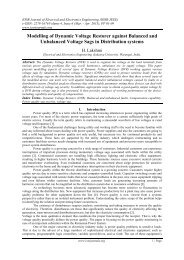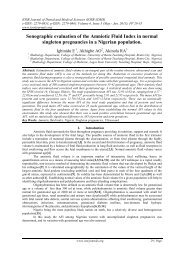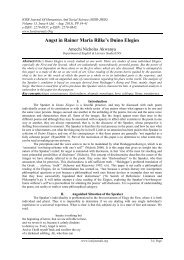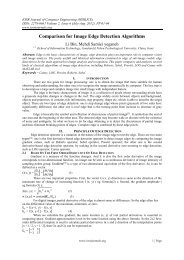Initial Conquest of India by Turks and Their Slaves - IOSR
Initial Conquest of India by Turks and Their Slaves - IOSR
Initial Conquest of India by Turks and Their Slaves - IOSR
Create successful ePaper yourself
Turn your PDF publications into a flip-book with our unique Google optimized e-Paper software.
Influencing factors <strong>of</strong> Mental Health <strong>of</strong> Adolescents at School Level<br />
[16] Joyce.L.Epstein & Jame M.Mcpartl<strong>and</strong> (1976). The Concept <strong>of</strong> Measurement <strong>of</strong> Quality <strong>of</strong> School life, American Educational<br />
Research Journal, Vol.13, No.1 pp.15-30.<br />
[17] KamlajeetKaur Mehta (1994), “Parent child relation-An imp. envtal variable influencing intelligence <strong>of</strong> children, Journal <strong>of</strong><br />
Psychological Researches Vol-38 PP 10-13.)<br />
[18] Kundu, Ramanath; Basu, Jayanti (1991). Frustration reactions as predictors <strong>of</strong> academic achievement <strong>and</strong> personality dimensions <strong>of</strong><br />
school children. Psychological Studies, Vol 36(3), 146-155.<br />
[19] Kupersmidt, J. B., & Patterson, C. J. (1991). Child-hood peer rejection, aggression, withdrawal, <strong>and</strong> perceived competence as<br />
predictors <strong>of</strong> self-reported behavior problems in preadoles-cence. Journal <strong>of</strong> Abnormal Child Psychol-ogy, 19, 427-449.<br />
[20] La Greca, A. M., & Prinstein, M. J. (1999). The peer group. InW. K. Silverman & T. H. Ollendick (Eds.), Developmental issues in<br />
the clinical treatment <strong>of</strong> children <strong>and</strong> adolescents (pp. 171–198.) Needham Heights, MA: Allyn & Bacon.<br />
[21] Little, S.A., & Garber, J. (1995). Aggression, depression, <strong>and</strong> stressful life events predicting peer rejection in children. Development<br />
<strong>and</strong> Psychopathology, 7, 845-856.<br />
[22] PrahbhjotMalhi (2000), Guiding Parents in effective disciplining strategies that work, journal <strong>of</strong> community guidance <strong>and</strong> research,<br />
vol 17, pp 129-141.<br />
[23] Rao N 1989. Parent Child Relation Scale. Agra:National Psychological Corporation.<br />
[24] S. Rueger, C. Malecki, M. Demaray 2010. Relation between multiple sources <strong>of</strong> perceived social support <strong>and</strong> psychological <strong>and</strong><br />
academic adjustment in early adolescence: Comparisons across gender. Journal <strong>of</strong> Youth <strong>and</strong> Adolescence, 39 (2010), pp. 47–61.<br />
[25] Scholte RHJ, van Lieshout CFM, van Aken MAG. Perceived relational support in adolescence: dimensions, configurations, <strong>and</strong><br />
adolescent adjustment. J Res Adolesc. 2001;11:71–94.<br />
[26] Shanty, K.J &Anita Ravindran (1998) Parental Discplinary practices <strong>and</strong> adolescent reactions to frustration, Journal <strong>of</strong> community<br />
guidance & Research, vol 15 pp 55-61.<br />
[27] Sowaid.M et al (1986), A study <strong>of</strong> Parent child interaction <strong>and</strong> achievement motivation among tribal high school students, Journal<br />
<strong>of</strong> Institute <strong>of</strong> Educational Research 10(3), pp. 24-27<br />
[28] Steinberg L; Lamborn, S.D; Dornbusch, S.M & Darling N (1992) Impact <strong>of</strong> parenting practices on adolescent achievement<br />
Authoritative parenting school involvement <strong>and</strong> encouragement to succeed. Child Development, 63, 1266-1281.<br />
[29] SudhaKatyal&PromilaVasudeva (1998) affect <strong>of</strong> socio-personal Factors on Academic stress among Adolescents, <strong>India</strong>n Journal<br />
<strong>of</strong>Applied Psychology, vol 35 pp 35-37.<br />
[30] Suman L.N (1997) Parent-Child relation <strong>and</strong> achievement motivation journal <strong>of</strong> psychological researches, vol 41 pp 66-73.<br />
[31] Suman L.N <strong>and</strong> A.Umapathy (2003), Parent Child Relation And Achievement Motivation, <strong>India</strong>n Psychological review, 61, 20 -27.<br />
[32] Sunitha, B., <strong>and</strong> Mayuri,K., (2001). Age <strong>and</strong> Gender differences on factors affecting high academic achievement. Journal <strong>of</strong><br />
Community guidance <strong>and</strong> Research 18(2): 197 – 208.<br />
[33] Uma Devi L & Royal U.J.R (2004) Adolescents perception About Family Environment <strong>and</strong> Emotional Intelligence, <strong>India</strong>n<br />
psychological Review, vol 62, pp 157-167.<br />
[34] Vernberg, E. M. (1990). Psychological adjustment <strong>and</strong> experiences with peers during early adolescence: Reciprocal, incidental, or<br />
unidirectional relations? Journal <strong>of</strong> Abnormal Child Psychology,18, 187–198.<br />
[35] Wentzel, K. R. & Asher, S. R. (1995). The academic lives <strong>of</strong> neglected, rejected, popular, <strong>and</strong> controversial children. Child<br />
Development. 66, 754-763.<br />
[36] World Health Report 2001 - Mental Health: New Underst<strong>and</strong>ing, New Hope, World Health Organization, 2001.<br />
www.iosrjournals.org<br />
56 | Page


